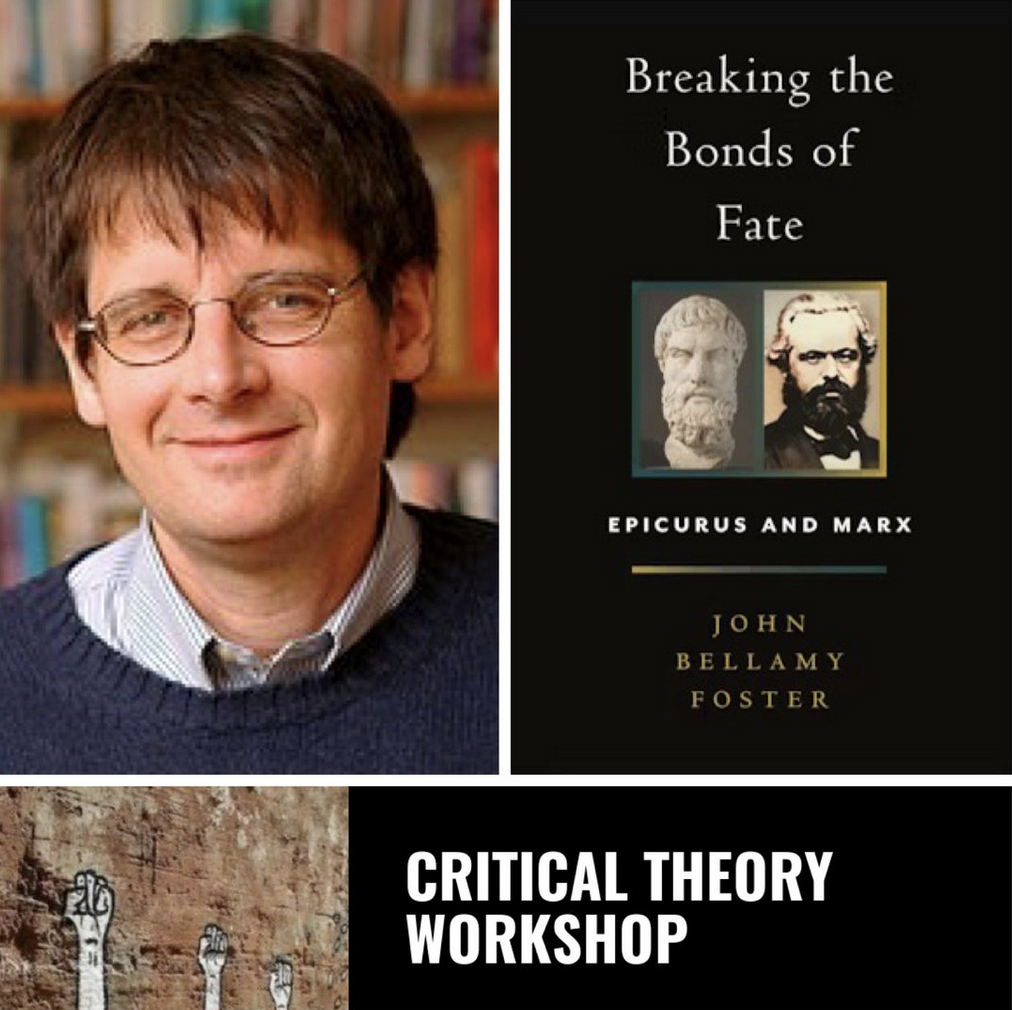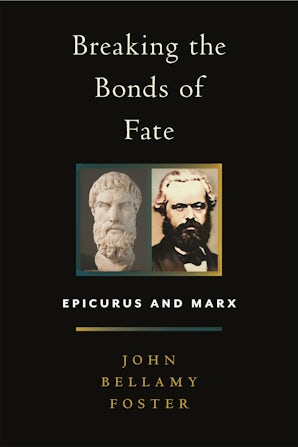John Bellamy Foster’s “Breaking the Bonds of Fate”

In the public eye:
The Critical Theory Workshop was first to launch John Bellamy Foster’s excellent new work. Speakers alongside Foster included Boris Hennig and Paul Schafer, with Jennifer Ponce de León of The Critical Theory Workshop serving as the moderator: https://www.youtube.com/live/1PrDLsHiKkk

About Breaking the Bonds of Fate
The immanent dialectic of the ancient Greek materialist philosopher, Epicurus (341-270 BCE), helped inspire the nineteenth-century ideas of Karl Marx, forming the subject of his doctoral dissertation. Marx’s detailed study of Epicurus led him to develop his own materialist dialectic in distinction to the idealist philosophy of G. W.F. Hegel. Until now, however, there has been no full scholarly treatment of the relation of Epicurus to Marx, paying equal attention to both thinkers and examining the long-term impact of Epicureanism on Marxist thought.
Breaking the Bonds of Fate: Epicurus and Marx fills this gap. Taking into consideration today’s revolution in the understanding of Epicurus—resulting from the recovery of fragments of his major work On Nature in the carbonized papyri that survived the burying in volcanic ash of the Roman town Herculaneum when Mt. Vesuvius erupted in 79 CE—it demonstrates that this new interpretation corresponds closely to Marx’s nineteenth-century treatment of Epicurus. The result is to fundamentally transform our contemporary understanding of both Epicurus and Marx.
The last (though logically the first) book to be written in a trilogy that also includes John Bellamy Foster’s Marx’s Ecology: Materialism and Nature (2000) and his The Return of Nature: Socialism and Ecology (2020), Breaking the Bonds of Fate: Epicurus and Marx provides a detailed historical and textual analysis grounding the argument of all three works. Not only does this clarify Marx’s relation to materialism and ecology, but also his analysis of the of freedom and necessity. Both Epicurus’ philosophy and that of Marx are given new meaning in our time, highlighting questions of substantive equality, dialectical naturalism, and sustainable community.
Praise for: Breaking the Bonds of Fate
From David Sedley, The Hellenistic Philosophers (coeditor, cotranslator with A.A.Long): “This is a book we have long needed. A dark corner of the young Marx’s intellectual formation is convincingly lit up, by an author with an impressive command of both Epicurean atomism and the history of 19th-century German philosophy.”
From Michael Heinrich, Karl Marx and the Birth of Modern Society: “Offering a new perspective on Epicurus, this book provides an impressive presentation of Marx’s materialism from an Epicurean point of view. Absolutely fascinating!”
From A.A.Long, Hellenistic Philosophy: Stoics, Epicureans, Sceptics: “Breaking the Bonds of Fate is a splendid contribution to intellectual history. With a combination of panache and scholarly rigour Foster presents Epicurus as a major influence on Marx and Marxism. in Epicurus Karl Marx found a highly congenial philosophy thanks to the Greek thinker’s materialism, naturalistic physics, anthropology and rejection of fatalistic determinism. This book casts new light on the ancient thinker’s presuppositions and the German context of Marx’s doctoral dissertation on the differences between Democritus and Epicurus.”
From Thomas Nail, Marx in Motion: A New Materialist Marxism and Lucretius I, II, and III: “A breathtaking intellectual, philosophical, and political history of Epicurus and Marx for which there is no equivalent. This is the final and culminating book in Foster’s trilogy and for me, the most synthetic and powerful. Marx and Epicurus is the kind of extremely well researched book that will be cited for many years to come on this topic.”
Excerpted From the Introduction
Praxis: Ancient and Modern
“In terms of praxis, or the dialectic of theory and practice, the contribution of Epicurus’s philosophy was affected by the fact that he was writing at a time of an “empire of chaos” that ensued during the Wars of the Diadochi (or Successors) over Alexander’s Empire, and the related demise of the polis.9 Nevertheless, his emphasis on contingent freedom was an important break from the fatalism of his time. Although he advised his followers to avoid where possible any serious engagement in the political life of the time, he also supported taking direct actions on behalf of friends who were victims of injustice. In a famous case, Epicurus, and his follower Metrodorus, intervened in support of their friend the Syrian Mithres when he was imprisoned in Piraeus, reflecting the fact that in Epicurean philosophy the distinction between Greek and “barbarian” had been dissolved. Epicurus was well known for providing aid, in the form of bushels of food, from his limited means, to those in distress.10 In general, the social praxis promoted by Epicurus in the Hellenistic Age was one of defiance of the state (astral) religion, accompanied by a relatively distant relation to the polis itself, focusing instead on creating self-sufficient communities rooted in friendship, the reconciliation of humanity and nature, egalitarianism, and ataraxia, or contentment. The emphasis was on internal human development, cultivation of philosophy, and an atmosphere of reciprocity and “mutual exchange.”11 “Nothing is enough,” Epicurus wrote, “for those for whom enough is too little.”12
The significance of Epicurus and Epicureanism for an understanding of classical historical materialism and for the renewal of Marxism today should be readily apparent. The one-sided Western Marxist philosophical tradition, for all of its immense contributions, was based from its beginning in the 1920s on a rejection of materialist dialectics, or the dialectics of nature, and thus of natural science. This translated into the negation of any meaningful materialist conception of nature. Yet, without a thoroughgoing materialist perspective it is impossible to perceive the relation of humanity to nature, of which we are a part. In terms of Marx’s later analysis, this requires recognizing how the labor and production process constitutes the specific human “social metabolism” within the “universal metabolism of nature.” The relation of freedom to necessity, peculiar to our time, demands a dialectical perspective, one that refuses to divide nature from society, while recognizing the contradictions imposed by capitalism in that respect.13
In any attempt to address Marx’s materialism, his “genetic exposition” of Epicurus’s philosophy, exploring its “objective logic,” is of decisive importance given its genetic relation to his own materialism and dialectical method.14 Reduction of historical materialism to a purely social dialectic, excluding the natural-material realm, has robbed Marxian theory of its earthly basis, including any understanding of the relation of freedom and necessity. The result is to negate the whole larger conception of revolutionary struggle as aimed at the creation of a society of sustainable human development…”
To read more, get your copy here.
BIO
John Bellamy Foster is a Professor Emeritus of Sociology at the University of Oregon and editor of Monthly Review. He has written many books including Marx’s Ecology and The Return of Nature, which won the Deutscher Memorial Prize.

